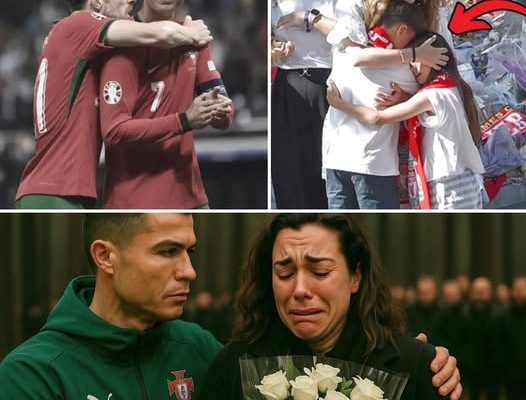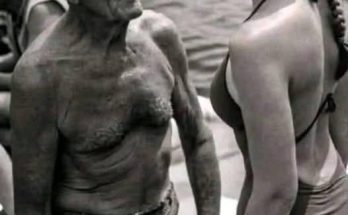Cristiano Ronaldo, a global football legend, is celebrated not only for his unparalleled skills on the pitch but also for his generosity off it. Stories of his philanthropy, from funding medical treatments to supporting charities, have become part of his public persona. One claim that has circulated widely is that Ronaldo promised to pay for the education of his teammate Diogo Jota’s son until the child turns 18. This article investigates the origins of this story, evaluates the evidence, and explores whether it aligns with Ronaldo’s known charitable efforts, all while dissecting the dynamics of how such narratives spread.
The claim suggests that Ronaldo, during his time playing alongside Diogo Jota for the Portugal national team, committed to covering the educational expenses of Jota’s son until he reaches 18. The story has spread through social media, fan forums, and online discussions, portraying Ronaldo as a compassionate figure supporting a teammate’s family. But is there substance to this claim, or is it a product of rumor and speculation? Let’s examine the details.
First, we need to clarify who Diogo Jota is. Born on December 4, 1996, Diogo Jota is a Portuguese footballer who plays for Liverpool FC and represents Portugal internationally, often alongside Ronaldo. Jota is married to Rute Cardoso, and their son was born in 2021, making him approximately four years old as of July 2025. This raises an immediate issue: if Jota’s son is only four, a promise to fund his education until age 18 would be a long-term commitment that hasn’t yet come to fruition. The timeline alone casts doubt on the claim’s plausibility.
The story appears to have originated on social media platforms like X, where fans frequently share anecdotes about celebrities. Posts claiming Ronaldo’s generosity toward Jota’s son have surfaced, but they typically lack verifiable details. For example, a 2024 post on X stated, “Ronaldo’s paying for Jota’s kid’s schooling till he’s 18, what a legend!” Yet, it provided no source or context. Major sports outlets like ESPN, BBC Sport, or Portuguese media such as A Bola have not reported this story, and neither Ronaldo nor Jota has publicly confirmed it. The absence of primary sources—interviews, statements, or documents—is a significant barrier to verifying the claim.
To gauge whether this fits Ronaldo’s character, let’s consider his philanthropic history. Ronaldo has a well-documented record of generosity. In 2012, he paid for a young boy’s cancer treatment in Portugal, covering medical costs for the family. He has donated millions to charities, including funding a pediatric ward in Madeira and supporting educational initiatives in Gaza through Save the Children. In 2016, he gave his €600,000 Champions League bonus to a children’s education charity. These acts demonstrate Ronaldo’s commitment to supporting education and children’s welfare, which could make the Jota story seem plausible. However, his documented efforts typically involve public causes or high-profile charities, not private arrangements with teammates, which makes this claim stand out as unusual.
The timeline further complicates the narrative. Jota’s son, born in 2021, won’t require formal education funding for several years, and a commitment to pay until age 18 would extend into the mid-2030s. While Ronaldo and Jota have played together for Portugal, including in the 2020 UEFA Nations League, there’s no evidence of a close personal relationship that would prompt such a specific promise. Additionally, Jota is a high-earning Premier League player with a lucrative contract at Liverpool FC. It’s unlikely he would need financial assistance for his son’s education, raising questions about why Ronaldo would make such an offer absent extraordinary circumstances, like a medical or financial hardship, which no reports indicate.
Several factors could explain the story’s emergence. First, it might be a case of misinterpretation or confusion. Ronaldo may have supported someone else’s education, and the story was mistakenly attributed to Jota’s son. Alternatively, “Jota” could refer to another individual, though no other prominent figure by that name is closely tied to Ronaldo. Second, the claim could be a fabrication, created by fans or clickbait sites to generate engagement. Social media thrives on heartwarming narratives, and a story about Ronaldo’s generosity fits this mold perfectly. Third, the story may have been amplified by fans eager to enhance Ronaldo’s image, leading to its spread without verification.
The lack of evidence is striking. Credible journalism requires primary sources, such as direct quotes from Ronaldo or Jota, or reports from reputable outlets. Here, we have neither. Social media posts and fan blogs often rely on vague “insider” knowledge or hearsay, which doesn’t hold up under scrutiny. Without confirmation from those involved, the story remains speculative at best.
This claim reflects a broader trend in celebrity culture, where stories of philanthropy often blur the line between fact and fiction. Ronaldo, like other stars such as Lionel Messi or LeBron James, is frequently the subject of anecdotes that bolster their public image. While many of these stories are true, others are exaggerated or invented to attract attention. In the digital age, social media platforms like X can amplify unverified claims, turning rumors into widely accepted “facts.” Fans’ admiration for their idols often leads to a lack of skepticism, allowing such stories to spread unchecked.
The story also raises questions about the nature of celebrity philanthropy. Ronaldo’s verified acts of kindness—donating to hospitals, supporting disaster relief, helping fans—show he’s capable of significant generosity. However, unverified claims like this one risk overshadowing his real contributions by introducing doubt about what’s true. Fans and media consumers should approach such stories critically, seeking evidence before accepting them as fact. This doesn’t diminish Ronaldo’s legacy; rather, it ensures his genuine acts of kindness are celebrated for their authenticity.
There’s also the possibility that the story evolved from a kernel of truth. Ronaldo might have made a casual comment about supporting Jota’s family, which was exaggerated into a specific promise about education. Alternatively, he could have offered a different form of support, like a donation to a cause Jota cares about, which was misreported. Without concrete details, these remain guesses. The story’s persistence highlights Ronaldo’s reputation as a generous figure, but reputation alone isn’t evidence.
The dynamics of how such stories spread are worth noting. Social media platforms, with their rapid sharing and minimal gatekeeping, allow rumors to gain traction quickly. A single post can be retweeted thousands of times, reaching millions before anyone verifies its accuracy. This is especially true for feel-good stories about celebrities, which tap into fans’ desire to see their heroes as moral exemplars. The lack of accountability on these platforms means that once a story takes hold, it can be hard to debunk, even when evidence is absent.
To put this in perspective, consider similar stories about other athletes. Messi has been credited with paying for fans’ medical bills, and while some instances are verified, others are not. LeBron James has faced similar unconfirmed claims about funding schools or individuals. These stories often follow a pattern: a celebrity’s known generosity inspires rumors of additional, unverified acts. The Jota story fits this mold, leveraging Ronaldo’s established philanthropy to give it credibility, even without proof.
Ultimately, the claim about Ronaldo funding Jota’s son’s education until age 18 lacks substantiation. The timeline, Jota’s financial independence, and the absence of primary sources all suggest it’s a rumor, likely born on social media and spread through fan enthusiasm. While Ronaldo’s history of philanthropy makes the story plausible in spirit, no evidence supports this specific act. This case underscores the importance of critical thinking in evaluating celebrity narratives. Fans should celebrate Ronaldo’s verified contributions—his donations to hospitals, schools, and charities—while questioning unconfirmed tales to ensure his legacy remains grounded in truth.



